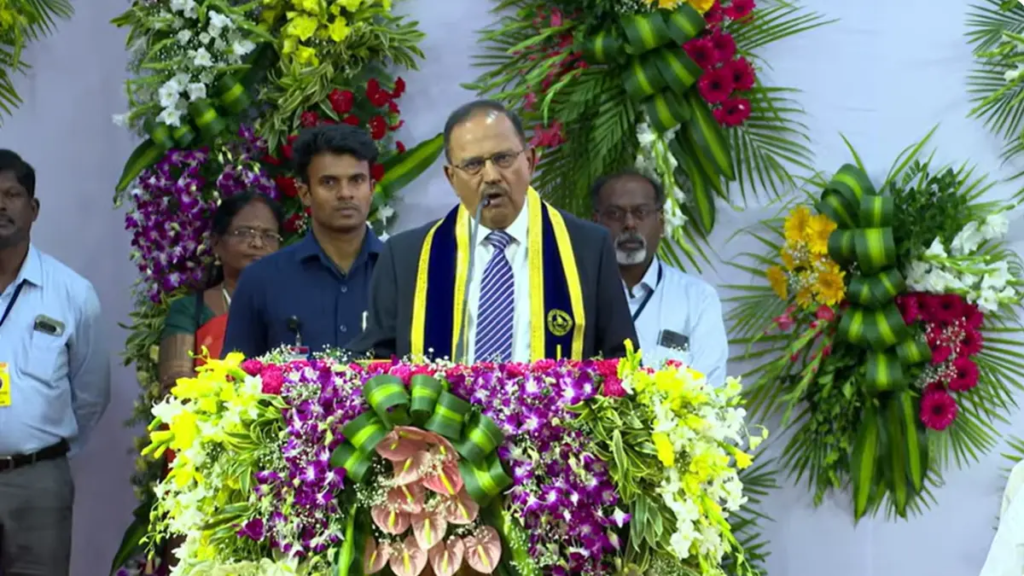
India’s National Security Advisor Ajit Doval
We are proud of the role played by indigenous technologies in Operation Sindoor, right from Brahmos, radars, integrated air control and command systems and other surveillance tech, India’s National Security Advisor Ajit Doval said in a rare public appearance on Friday.
Speaking at IIT Madras’ 62nd Convocation ceremony in Chennai, Doval explained that as part of Operation Sindoor India decided to have nine targets across Pakistan (not just border areas), and they were precise and “missed none.” The entire operation that night took 23 minutes, he added.
“Foreign press said Pakistan did that and this…But you show me one photograph, one image, which shows any damage to any Indian (structure), even a glass pane has not been broken,” he noted, speaking about world commentary after Sindoor.
He expressed his appreciation for the academia and private sector of the country crediting their efforts in making India self-reliant in various technologies. “The Chinese have taken 12 years and over $300 billion to develop 5G but we don’t have such time and money but wanted trusted sources for our communication systems. So we turned to our academia and private sector and within 2.5 years we were indigenous in 5G,” he said. “Today, everything related to our nation’s data security and communications is either made in India or comes from a trusted source,” he added.
The national security leader said Artificial Intelligence (AI) is going to change the world, and If India wants to lead the world, it must embrace and lead AI, quantum computing and space tech among others. He urged the graduating class to combine their growth and progress with that of India’s and contribute to its growth.
“When we complete 100 years of independence, you will be in the prime of your careers; India may then have a GDP of over 30 trillion, the Per capita income may be around $22,000 and we will have a working population of 1.1 billion,” he noted.
Dr. Padma Subrahmanyam, Padma Vibhushan awardee and legendary danseuse, was the Guest of Honour of the event. She noted that she was the only other woman, besides former PM Indira Gandhi, to offer the convocation address at the institute. She addressed the graduating class on the theme of ‘Panoramic view of Bharat culture.’
IIT-Madras director V Kamakoti said in his address that the institute will establish a semiconductor fabrication (Fab) facility in the coming months, which will serve as a hub for skill development training, design expertise and product development in collaboration with industry. “An Indian Army-IITM Research Centre, a dedicated Centre of Excellence is also being established to harness the potential of the Institute in various technology domains,” he added.
Offering a report of IIT-Madras’ achievements in 2024-25, the director highlighted major milestones, including the institute surpassing the vision of ‘Startup Shatham’ . “IIT Madras Incubation Cell (IITMIC) has incubated as many as 103 new deep core-tech startups during 2024,” he said. IIT Madras has become the first IIT in the country to introduce ‘Fine Arts and Culture Excellence’ (FACE) Admission to Under-graduate Programs from the Academic year 2025-26, and in the current academic year, IIT Madras has also launched ‘Science Olympiad Excellence’ (ScOpE) admissions to undergraduate programs for students who excel in the National and International Olympiads.
IIT-M has retained the #1 position for the sixth year in a row for overall performance among all universities in India, number 1 position among Engineering Institutes for the ninth year since inception of NIRF rankings, he added.
Around 3,050 graduates will receive their degrees at the convocation, and for the first time, the institute also awarded more than 500 PhD degrees, with 529 students receiving PhDs.
Published on July 11, 2025

